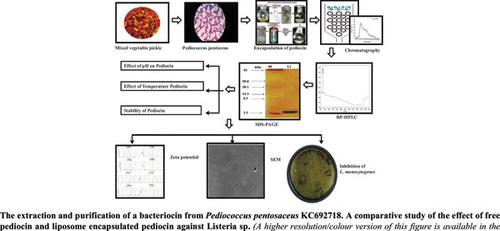Protein & Peptide Letters ( IF 1.6 ) Pub Date : 2021-09-30 , DOI: 10.2174/0929866528666210816115645 Amanda Machado 1 , Janaína Ribeiro Oliveira 1 , Deborah de F Lelis 1 , Victor Hugo D Guimarães 1 , Alfredo M B de Paula 1 , Andre L S Guimarães 1 , Igor V Brandi 2 , Bruna Mara A de Carvalho 2 , Diego Vicente da Costa 2 , Cláudia Regina Vieira 2 , Ulisses Alves Pereira 2 , Theles de Oliveira Costa 2 , João M O Andrade 2 , Robson Augusto Souza Santos 3 , Sérgio H S Santos 1

|
Background: Obesity is a serious health problem that dysregulate Renin-Angiotensin System (RAS) and intestinal microbiota.
Objective: The present study aimed to evaluate the Angiotensin-(1-7) [ANG-(1-7)] oral formulation effects on obese mice intestinal microbiota.
Methods: Mice were divided into four groups: obese and non-obese treated with ANG-(1-7) and obese and non-obese without ANG-(1-7) during four weeks.
Results: We observed a significant decrease in the fasting plasma glucose, total cholesterol, triglycerides, and Low-density lipoprotein levels and increased High-density lipoprotein in animals treated with ANG-(1-7). The histological analysis showed intestinal villi height reduction in mice treated with ANG-(1-7). Additionally, increased Bacteroidetes and decreased Firmicutes (increased Bacteroidetes/ Firmicutes ratio) and Enterobacter cloacae populations were observed in the High-Fat Diet + ANG-(1-7) group. Receptor toll-like 4 (TLR4) intestinal mRNA expression was reduced in the HFD+ANG-(1-7) group. Finally, the intestinal expression of the neutral amino acid transporter (B0AT1) was increased in animals treated with ANG-(1-7), indicating a possible mechanism associated with tryptophan uptake.
Conclusion: The results of the present study suggest for the first time an interaction between oral ANG-(1-7) and intestinal microbiota modulation.
中文翻译:

口服血管紧张素-(1-7) 肽调节肠道微生物群改善肥胖小鼠的代谢特征
背景:肥胖是一种严重的健康问题,会导致肾素-血管紧张素系统 (RAS) 和肠道微生物群失调。
目的:本研究旨在评估血管紧张素-(1-7) [ANG-(1-7)] 口服制剂对肥胖小鼠肠道菌群的影响。
方法:将小鼠分为四组:用 ANG-(1-7) 治疗的肥胖和非肥胖以及在 4 周内不使用 ANG-(1-7) 的肥胖和非肥胖。
结果:我们观察到用 ANG-(1-7) 治疗的动物的空腹血糖、总胆固醇、甘油三酯和低密度脂蛋白水平显着降低,高密度脂蛋白水平升高。组织学分析显示用 ANG-(1-7) 治疗的小鼠的肠绒毛高度降低。此外,在高脂饮食 + ANG-(1-7) 组中观察到拟杆菌门增加和厚壁菌门减少(拟杆菌门/厚壁菌门比率增加)和阴沟肠杆菌群。HFD+ANG-(1-7) 组的受体 toll 样 4 (TLR4) 肠道 mRNA 表达降低。最后,在用 ANG-(1-7) 治疗的动物中,中性氨基酸转运蛋白 (B0AT1) 的肠道表达增加,表明可能存在与色氨酸摄取相关的机制。
结论:本研究的结果首次表明口服 ANG-(1-7) 与肠道微生物群调节之间存在相互作用。



























 京公网安备 11010802027423号
京公网安备 11010802027423号